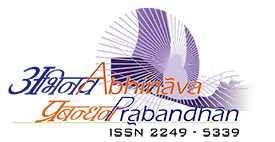Enlightened Leadership In Indian Ethos: The Way Of The Theory K
KEY WORDS
Enlightened leadership, Theory X, Theory Y , Theory Z & theory K, Indian Ethos
This paper elaborates the idea of theory K in the form of a combination approach to theories X, Y & Z. The metaphor of organisation as a family constitutes the keynote of this combination approach which can be mathematically represented as K = XaYbZc wherein coefficients a, b and c indicate the intensity with which managers tend to use X, Y or Z style. Driving metaphor is suggested to indicate the matrix nature of the theory K wherein the attempt is to achieve proper matching between the managerial styles and situational requirements. Paper further presents an Indian model of enlightened leadership by combining the Indian guna theory and the management theories X, Y and Z. This model is based on a new approach to personality theory that can be referred to as “WE” or the West-East approach wherein human personality is thought in terms of six elements represented by personality set (tamasik, rajasik, sattavik, X, Y & Z). The model has three subsets viz. (Tamasik, X), (Rajasik, Y) and (Sattavik, Z). It is suggested that enlightened leaders create transformation towards (Rajasik, Y) and (Sattavik, Z) situations, because (Tamasik, X) personality creates considerable negative energy or negergy in organisations. Author’s empirical impressions and case studies from Indian history and Indian social and business context provide a preliminary evidence in favour of this Indian model of enlightened leadership.
“Whatever a great person does, is followed by others; People go by the example the person sets up” Gita 3-21
Is there an “Indian” theory of management, administration and leadership? In this paper we explore an Indian way of managing through the use of theory K derived from the metaphor of Kutumbh or family.
The idea of organization as Kutumbh or family is derived from the Indian concept of “vasudhev kutumbhkam” i.e. entire world is our family. In addition, theory K recognizes the “need for freedom” and “need for justice” as fundamental human requirements.
It may be indicated that in general, these needs have not been widely recognized in the management literature which in the past has usually restricted itself to McClleland’s narrow view of needs in terms of achievement, affiliation and power. Before we explain the theory K, there is also a need to explore the inter-connectivity of well known theories of management viz. theories X, Y and Z with earlier intuitive ways of expressing the same ideas.
In general, there is a tendency to use dichotomous categories of tradition and modernity in viewing the past and present. As a result, we do not see the inter-connectivity of origin of many ideas to the ‘ancient wisdom’. However, once we take the approach of continuity of the past into the present or the continuity of the tradition into modernity our perspective changes. In this perspective, modernity is not a
break from the past but a flow of the past into
present. Since tradition and modernity are intertwined and inter-connected, we can observe the “linked-continuity” or inter-connectivity of a number of management concepts and theories to the traditional concepts presented to us in simple and sublime language. For example theories X, Y and Z have been known to the Indian mind in various forms through different metaphors. Therefore they appear to be familiar, similar and even identical to earlier concepts. We will present a few of such metaphors subsequently. However, it may be emphasized that these ideas have been refined by the theorists for applications in modern corporate contexts. Thereby they have acquired the status of being classified as management theories. In theory K we present a similar refinement of a widely practiced concept. An initial and introductory discussion on theory K is available in this author’s work related to “New Age Management”.
Subhash Sharma
The author is Director at Indus Business Academy, Bangalore, India.
